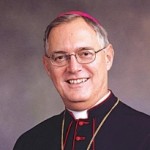
While in Rome I made the delightful acquaintance of the BBC Online’s Paul Burnell, who is as jolly a chap as you may find in the pleasant pastures, and a smartie to boot. During a break, Paul and I conversed a bit about Newman, and he betrayed how passionately inspired he was by the dramatic story of Newman’s reception into the church, “here is Dominic; he is only just arrived, weary from traveling, soaking wet to the bone, shivering at the fireplace, and before he can even get comfortable Newman is at his feet begging to be received into the church…”
I had known the story, but Burnell’s awestruck emotion at the re-telling brought it to life for me, in a new way; I thought, “what a one-act play this would make…”
At the urging of author Mary DeTurris Poust, another Church Up Close alum (we have certificates of participation, and everything!) invited Paul to guest-blog his on-the-ground experience of Newman’s beatification and he does so, invitingly, here, revisiting Bl. Dominic’s own Passionist background in the process. You’ll want to hop over there and read it.
In another vein, Burnell cites a powerful address from Benedict:
“There are many temptations placed before you every day — drugs, money, sex, pornography, alcohol — which the world tells you will bring you happiness, yet these things are destructive and divisive. There is only one thing which lasts: the love of Jesus Christ personally for each one of you. Search for him, know… him and love him, and he will set you free from slavery.”
I remember listening to Benedict utter those words and thinking, “oh, Bang, Papa! No one will accuse you of not being forthright!”
Those were, indeed, strong words. Benedict hit the ground running in the UK, intent on making the case away from “aggressive secularism” and he never let up, always, always, speaking of the love of Christ, and him crucified. But I think what has resonated most strongly with me–what struck me as the powerful message that cannot be delivered too often, to people of any age–was this:
One of the Cardinal’s best-loved meditations includes the words, “God has created me to do him some definite service. He has committed some work to me which he has not committed to another” (Meditations on Christian Doctrine). Here we see Newman’s fine Christian realism, the point at which faith and life inevitably intersect. Faith is meant to bear fruit in the transformation of our world through the power of the Holy Spirit at work in the lives and activity of believers. No one who looks realistically at our world today could think that Christians can afford to go on with business as usual, ignoring the profound crisis of faith which has overtaken our society, or simply trusting that the patrimony of values handed down by the Christian centuries will continue to inspire and shape the future of our society. We know that in times of crisis and upheaval God has raised up great saints and prophets for the renewal of the Church and Christian society; we trust in his providence and we pray for his continued guidance. But each of us, in accordance with his or her state of life, is called to work for the advancement of God’s Kingdom by imbuing temporal life with the values of the Gospel. Each of us has a mission, each of us is called to change the world, to work for a culture of life, a culture forged by love and respect for the dignity of each human person. As our Lord tells us in the Gospel we have just heard, our light must shine in the sight of all, so that, seeing our good works, they may give praise to our heavenly Father (cf. Mt 5:16).
I love that in the midst of tens of thousands, Benedict uses Newman to remind each of us that we are unique, individually loved into being and part of the unfolding plan of a loving God. And it is a particularly important message to speak to our young, who are living in a paradoxical era: so many choices are before them, that they sometimes have trouble understanding which is meant for them. And in our instrumentation-laden world, how difficult it can be to hear where one is called. This can’t but help:
Here I wish to say a special word to the many young people present. Dear young friends: only Jesus knows what “definite service” he has in mind for you. Be open to his voice resounding in the depths of your heart: even now his heart is speaking to your heart. Christ has need of families to remind the world of the dignity of human love and the beauty of family life. He needs men and women who devote their lives to the noble task of education, tending the young and forming them in the ways of the Gospel. He needs those who will consecrate their lives to the pursuit of perfect charity, following him in chastity, poverty and obedience, and serving him in the least of our brothers and sisters. He needs the powerful love of contemplative religious, who sustain the Church’s witness and activity through their constant prayer. And he needs priests, good and holy priests, men who are willing to lay down their lives for their sheep. Ask our Lord what he has in mind for you! Ask him for the generosity to say “yes!” Do not be afraid to give yourself totally to Jesus. He will give you the grace you need to fulfill your vocation.
Kathryn Jean Lopez gets some additional first-hand feedback on the beatification and Benedict’s bust-up of the stereotypes, in an interview with the really marvelous Leonie Caldecott.
Lopez: “Heart speaks unto heart,” we have been told, was Cardinal Newman sealing his homosexuality on his grave, in being buried with Ambrose St. John. Well, is it?
Caldecott: In a word, no! It is taken from St. Francis de Sales, another remarkably balanced spiritual figure. It refers in the first place to the discourse between the human and the Divine heart. So to prayer, understood as a personal relationship with the Lord, the experience of being perfectly understood by our creator, of being truly ourselves with Him. However it extends to human relationships, in that dynamic correspondence indicated by Jesus when he summed up the commandments in two moments: Love God, and love your neighbor as yourself. Also we need to pay attention to the “Loquitur” of the phrase: closeness to God ultimately makes it easier for us to communicate with one another, to hear one another. The heart of God makes eloquence possible…
A fascinating interview that is exceedingly difficult to excerpt with justice; you’ll want to read it all. I promise you, if you read only Burnell’s piece and Lopez’s interview, today, you will feel wonderfully well-fed and content!
Also these:
British PM: You have challenged the whole country to sit up and think and the unlikely ally










